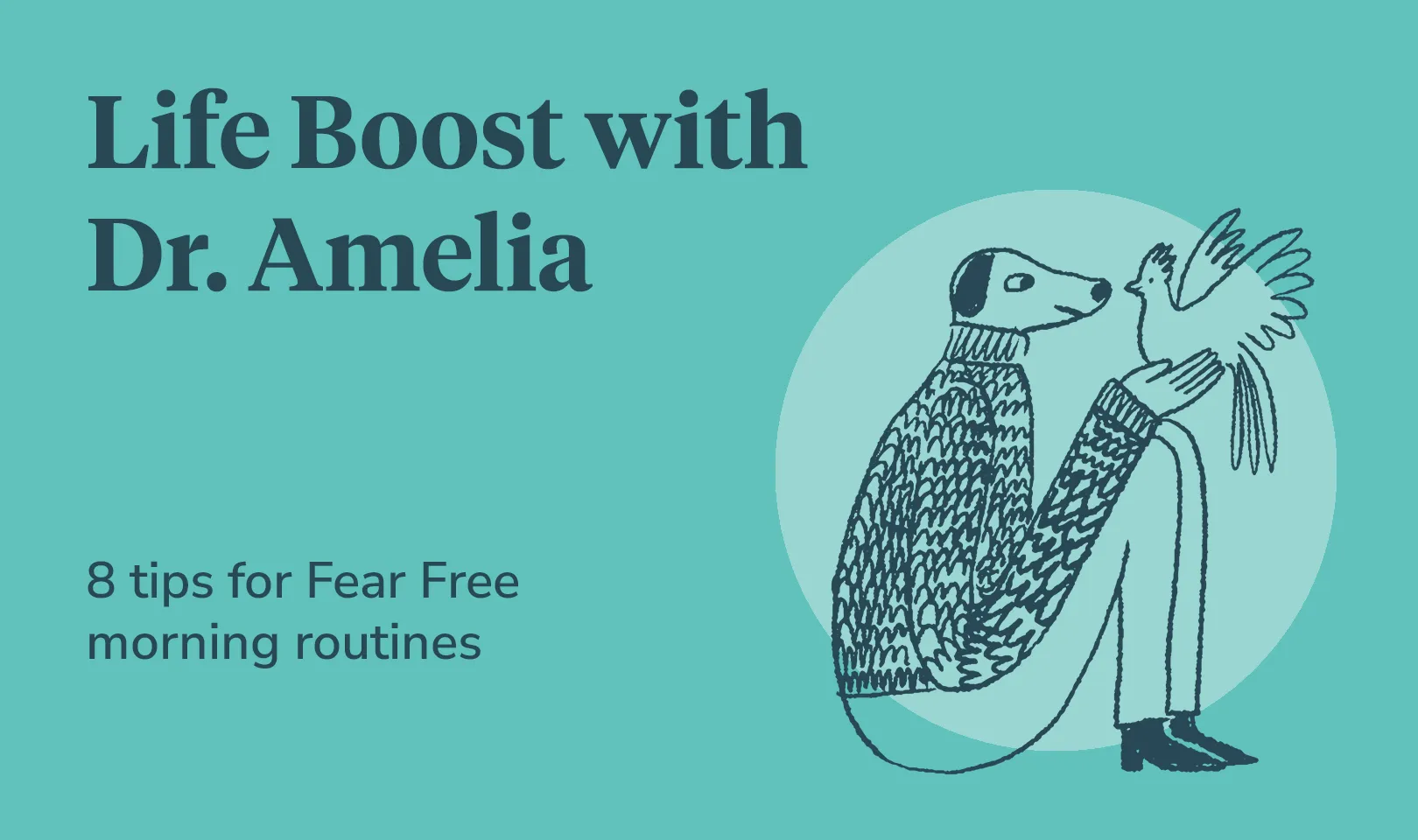Life Boost with Dr. Amelia: 8 tips for Fear Free morning routines


In Life Boost with Dr. Amelia, Associate IndeVet and health coach Dr. Amelia Knight shares tips to lead a happier and healthier life as a veterinarian.
As a health coach and veterinarian, decreasing the stress of humans and animals around me so that they feel their best is a top priority. Recently, I became Fear Free certified. While many of the concepts seem simple, they make a huge difference in creating a positive, less stressful experience for the pet. As I went through the certification, I realized how many principles apply to humans, too!
This is the first in a series of posts on how to apply Fear Free techniques in your own life to minimize stress and make a healthy lifestyle a more enjoyable, less intimidating experience.
Want more clinical & self-care content from IndeVets? Sign up here.
Getting a stress-free start
When we think about stress, the focus tends to be on what happens at the hospital. Yet, all the events leading up to the arrival have a huge impact on stress level—whether that’s for your patient or you.
Helping owners understand how to create a calm transport to the clinic helps to dramatically increase the chances of a positive experience. Are you using that same concept before you arrive at work? Let’s run through two scenarios:
Scenario 1: A cat is chased around the house, forced into an unfamiliar carrier as everyone scrambles to get out the door, bounced around like a suit case, and then put into a car with loud music and a driver yelling at slow traffic. By the time she arrives, her entire world has been turned upside down before you even put a hand on her. When someone immediately goes for a rectal temperature, that’s the last straw.
Scenario 2: The cat loves hanging out in her carrier because it is always kept by a window in the sun. The cozy carrier has blankets and pheromones creating a safe nook that she often chooses to nap in. On the day of her visit, the owner calmly closes the door while she is in it and smoothly transports her to the car. The car is quiet or has classical music playing and there’s a towel over the carrier for dim, relaxing lighting. Once she arrives at the clinic, she is securely transported into a quiet room and allowed to stay with her cozy blankets while she is scratched under the chin and offered food.
Which of these scenarios sounds like your own morning routine before arriving to work?
If you tend to stay up late and then hit snooze the next morning, don’t have time for breakfast, rush around frantically trying to get ready and out the door, and then get frustrated by slow traffic, your morning has already been full of micro-stressors. Work is much more likely to feel overwhelming when you arrive already in a stressed state.
Use these tips to create your own Fear Free morning routine for a much more enjoyable start to your day:
Tip #1: Give yourself time
Sleeping in as late as possible always seems like a great idea at the time. In the moment, a few more precious minutes seem totally worth it, even if that means sacrificing your planned workout, breakfast, or washing your hair.
Taking action is always going to feel harder than staying still. Remember Physics 101? An object at rest stays at rest. Rest feels comfortable, especially if the remainder of the day typically involves you running around like crazy until you collapse on your coach at night (another place that’s hard to leave).
But here’s the thing: those few extra moments in bed are much more likely to make the rest of your day more difficult than they are helping you to feel more rested. Have you ever thought, “I’m so glad I snoozed for 15 more minutes; I feel so well-rested now!”? Probably not. But fitting in a 15-minute run before work will give you a sense of accomplishment that boosts your energy throughout the day.
Working out consistently every morning became easy for me when I realized it helped me to wake up so much more than a little extra time in bed. If you’re not a morning person, is that because your typical morning is stress-inducing?
If you have a hard time getting up, keep your alarm across the room so you have to get out of bed to turn it off. Set your alarm so that you have enough time not to feel rushed. Ideally, set it to the same time each day so that your body starts to naturally wake up at that time.
And of course, try to resist that next episode of Love is Blind (just my own guilty pleasure?) so that you can get to bed on time.
More from Dr. Knight: Staying grounded in the New Year.
Tip #2: Check your hydration status
You pay attention to the hydration status of your patients, but what about yours? “Raisin brain” (as I like to call it) is no way to start the day.
Your brain is about 75% water! If you’re not properly hydrated, your brain can’t function optimally. As soon as you wake up, drink a large glass of water to support your body and mind before you turn to your first cup of coffee.
Speaking of coffee, do you ever get caught in the cycle of drinking more coffee to keep up with a busy day, but then you’re not able to sleep so you’re more tired, so you drink more coffee, and then you’re even more stressed?
Coffee can be great way to give your brain and mood an extra boost, but it can also contribute to feeling jittery or anxious. Be mindful of whether coffee is boosting your happiness and productivity or your anxiety and stress.
If you think coffee may be contributing to your stress but you can’t live without caffeine, test out green tea. The calming effect of L-theanine helps to balance caffeine for a more stable, less jittery energy. L-theanine is also in calming veterinary supplements like VetriScience Composure chews.
Tip #3: Set things out ahead of time
Just like it’s helpful to already have a carrier out for your cat, setting things out ahead of time helps to create a smooth and stress-free morning.
Take a minute to lay out your clothes the night before, pack a lunch, and have a designated work bag that always has items like your stethoscope, snacks, name tag, and pens so you don’t have to worry about frantically searching for a stray sock or your keys the next morning.
Tip #4: Do something that helps to keep you grounded
The things that happen at work may be out of your control, but you’re the CEO of your own life.
Make your morning pleasant by doing at least one thing that decreases your stress and helps you to feel grounded. This doesn’t have to be a big time commitment, but it will make a huge difference in your mindset heading into the day.
Take a few minutes to meditate, journal, get outside, work out, read, have a dance party in your bathroom, or whatever helps you to start your day on a positive note!
IndeVet Stories: How a cancer diagnosis led one doctor to re-evaluate her priorities.
Tip#5: Eat a nourishing breakfast
When you don’t have time for breakfast or you eat something like a donut with a lot of sugar but none of the nutrients your body needs, your day is going to feel harder that it has to be.
When you’re hungry by 10 a.m. and your blood sugar is dipping, a packed schedule is going to feel even more overwhelming. Everything feels miserable and irritating when you’re “hangry”.
When you take the time to make a nutrient-dense nourishing breakfast to fuel your morning, your body and mind are going to feel comforted and supported. It doesn’t have to take long! Try a quick egg mug with spinach, salsa, and avocado for amazing brain fuel to power you through your morning!
Tip#6: Plan ahead
Planning ahead makes a big difference in ensuring a stress-free morning. For patients, that may mean making sure that the owner has gabapentin or trazodone on hand to give to the pet before a visit.
As an IndeVet, one important piece is making sure I leave plenty of time for my commute. When traveling to a new hospital, I always use Google Maps the night before. By entering the day and desired arrival time, it tells me what time to leave to account for typical traffic. I also review the hospital profile so that I have an idea of what to expect in terms of flow, software, and products available.
Tip #7: Make your commute fun
You know what’s way more fun than yelling at traffic? A car dance party. When I started working as an IndeVet, my commute went from 6 minutes to sometimes an hour or longer. That has turned into a peaceful time in the morning to listen to a podcast or audiobook, call a friend, turn on some great music, or just let my mind wander.
If you tend to feel flustered or easily frustrated when driving, check out these mindset tips.
Tip #8: Create a predictable routine
Just like each pet is unique in what will help them to have a positive, low-stress visit, the same is true for you. Experiment and stay curious!
If your mornings often feel hectic, choose the most appealing and doable tip first and see how it influences your mindset and energy for the rest of the day. Once you find what works best for you, create a predictable routine so it becomes automatic.
I have an early bedtime, because I love having a couple of hours in the morning to have an energizing and uplifting start to my day. For me, that includes water, coffee or tea, journaling, working out, meditating, showering, a dance party, a nourishing breakfast, and listening to a podcast during my commute.
I’ve slowly created that routine because each one positively impacts the way I feel all day. Sometimes getting out of bed feels hard, but those are the days when I know it’s even more important to not skip my morning routine.
Final thoughts
While compassion towards your patients comes easy, check in with the compassion you’re showing towards yourself and your behaviors.
The more you invest in creating a stress-free start to your day, the more your patients will benefit when you have the energy and patience to help educate their owners on Fear Free practices, too.
Amelia Knight, VMD, cVMA, INHC is an Associate IndeVet and a veterinary life coach. Learn more at www.lifeboost.today, follow her on Instagram at @lifeboostwithamelia, or listen to her podcast.
More from IndeVets:
6 tips for hospital managers to create a happier workplace
On grief and grieving: An ER vet’s tale
